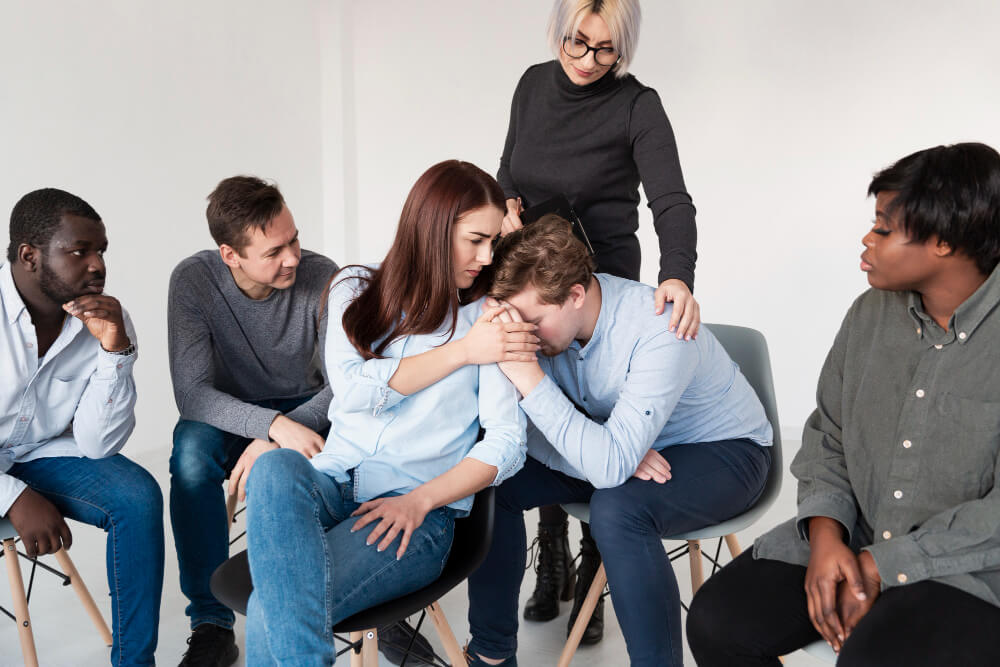Finding the right Intensive Outpatient Program (IOP) in Miami for mental health or addiction can feel overwhelming. We often meet people unsure of what an IOP involves, whether it’s right for them, or how to evaluate their options. These concerns are valid. The IOP you choose can profoundly impact your recovery, stability, and long-term well-being.
In this guide, we will explain an IOP in Miami for mental health, what to look for in a high-quality program, and how to choose one that meets your unique needs in Miami. Whether you’re seeking help for anxiety, depression, trauma, or addiction, this is your first step toward finding the support you deserve.
What Is an Intensive Outpatient Program IOP in Miami for mental health?
An Intensive Outpatient Program is a structured mental health or addiction treatment option that falls between regular outpatient therapy and full-time inpatient or residential care. IOPs are designed for individuals who need more support than weekly therapy but do not require 24-hour supervision in a hospital or residential setting.
People typically enter an IOP to manage conditions like:
- Depression
- Anxiety disorders
- Bipolar disorder
- PTSD
- Substance use disorders
- Dual diagnosis (co-occurring mental health and addiction)
An IOP may be appropriate when symptoms interfere with your daily life, but you can still live safely at home. It’s also a helpful step-down for those who have completed inpatient care and need structured support to transition back into the community.
What Should a High-Quality IOP Include?
Choosing the right program requires knowing what elements are essential for your care. A strong IOP will offer more than a few group sessions and a general treatment plan. It should provide a full spectrum of clinical and therapeutic services to help you stabilize, grow, and heal.
1. Licensed Mental Health Professionals
Ensure the program employs licensed clinicians, including therapists, psychiatrists, social workers, and addiction counselors. You should receive care from professionals trained and credentialed to treat complex conditions.
2. Evidence-Based Therapies
Your treatment should be grounded in approaches that have been researched and proven effective. Look for programs that use:
- Cognitive Behavioral Therapy (CBT)
- Dialectical Behavior Therapy (DBT)
- Motivational Interviewing (MI)
- Trauma-informed care
- Mindfulness-based interventions
These therapies are effective for managing a wide range of mental health and substance use issues.
3. Structured Weekly Schedule
An IOP usually runs 3 to 5 days a week for about 3 hours daily. It should include group therapy, individual sessions, and sometimes family or medication-related appointments. A consistent schedule supports accountability and emotional regulation.
4. Psychiatric and Medication Support
Not every person in an IOP needs medication, but access to psychiatric evaluation and ongoing medication management should be available. This ensures you receive comprehensive care, especially if medication is part of your wellness plan.
5. Dual Diagnosis Treatment
If you’re living with both a mental health condition and substance use challenges, it is critical to choose a program that treats both simultaneously. Dual diagnosis care helps you understand how these conditions interact and gives you the tools to manage both safely.
6. Discharge and Aftercare Planning
Recovery doesn’t end when you complete an IOP. The best programs will work with you on a detailed discharge plan. This may include referrals to weekly therapy, support groups, medication follow-up, or continued outpatient care. A solid aftercare plan reduces the risk of relapse and helps you maintain progress.

Detailed Checklist: How to Choose the Right IOP in Miami
Use the following checklist as a guide when researching or interviewing potential programs:
Does the IOP specialize in your needs?
Some programs focus on substance use, while others prioritize mood disorders or trauma. Choose one that matches your specific challenges.
Is the staff qualified and licensed?
Verify the credentials of therapists, psychiatrists, and clinical supervisors. Staff bios are often listed on the program’s website.
Do they provide a complete intake assessment?
You should begin with a comprehensive evaluation. This ensures the program creates a care plan suited to your goals, symptoms, and strengths.
Is therapy offered in your preferred language?
Miami is a multilingual city. If you prefer Spanish, Creole, or another language, make sure the IOP can provide services accordingly.
What is the program structure?
Find out the number of days per week, session times, and whether the schedule fits your life. Evening or morning options may help you maintain work or school commitments.
Are insurance and payment options transparent?
Financial stress can be a barrier to care. Make sure the program accepts your insurance or offers payment plans before enrolling.
Does the program include both group and individual therapy?
Both formats offer unique benefits. Individual sessions allow for deeper exploration, while groups offer peer connection and shared experiences.
Is medication management available?
If you are currently on medication or might benefit from it, access to psychiatric care should be a non-negotiable.
Does the program involve family when appropriate?
Mental health and addiction can affect the entire family system. Programs that encourage family therapy or education show a commitment to holistic healing.
Will you receive support after discharge?
Ask what happens after the IOP ends. Do they connect you with an outpatient therapist? Is there a relapse prevention plan in place?
How Improving Lives Now in Miami Aligns With IOP Best Practices
One example of an IOP meeting these standards is offered by Improving Lives Now in Miami. While your choice should depend on your fit and needs, this program demonstrates what high-quality care can look like.
Their IOP supports individuals facing depression, anxiety, trauma, and substance use. Services include individual and group therapy, access to medication management, and bilingual support. The program is structured around best practices like evidence-based therapies, flexible scheduling, and a strong focus on aftercare. Whether you’re transitioning from a higher level of care or need support beyond weekly therapy, this IOP offers a safe and structured space to work on recovery.

Tips for Making the Final Decision
If you’ve identified a few promising options, the next step is choosing the right fit. Here are a few strategies to help you decide:
- Schedule a tour or virtual consultation.Seeing the space and meeting staff can tell you a lot about whether you’ll feel comfortable there.
- Ask for a sample schedule. Knowing what your days will look like helps set realistic expectations.
- Request to speak with a clinician.This can give you a feel for the program’s tone and therapeutic approach.
- Read reviews and testimonials. While every experience is unique, hearing from others highlights strengths or concerns.
- Trust your instincts. Pay attention to how you feel during the intake process. Do you feel respected, understood, and safe?
Take the First Step: Choose the Right IOP for You
Recovery is not a one-size-fits-all journey. Choosing the best Intensive Outpatient Program in Miami is about finding the right balance of structure, flexibility, and personalized care. The right IOP will meet you where you are, challenge you to grow, and support you every step of the way.
If you’re ready to take that step, use the checklist above. Ask questions, advocate for yourself, and don’t settle for a program that doesn’t align with your goals. You deserve an informed, compassionate, and sustainable path to recovery.
You are not alone, and help is available. Your healing begins with the right choice.
Contact us today! Find the Right Balance of Support and Independence
Frequently Asked Questions
- What conditions are typically treated in an intensive outpatient program for mental health?
IOPs commonly treat depression, anxiety, bipolar disorder, PTSD, substance use disorders, and dual diagnosis conditions. - How long does an IOP usually last?
Most programs run for 6 to 12 weeks, depending on individual progress and clinical recommendations. - Can I work or go to school while enrolled in an IOP?
Yes. IOPs are designed to offer structure while allowing you to maintain daily responsibilities. - Will I see a psychiatrist in an IOP?
Many programs include psychiatric services. Confirm that a psychiatrist is available if medication is part of your care. - Do I need a referral to begin an IOP?
Not necessarily. Many programs allow you to self-refer and begin the intake process directly.
